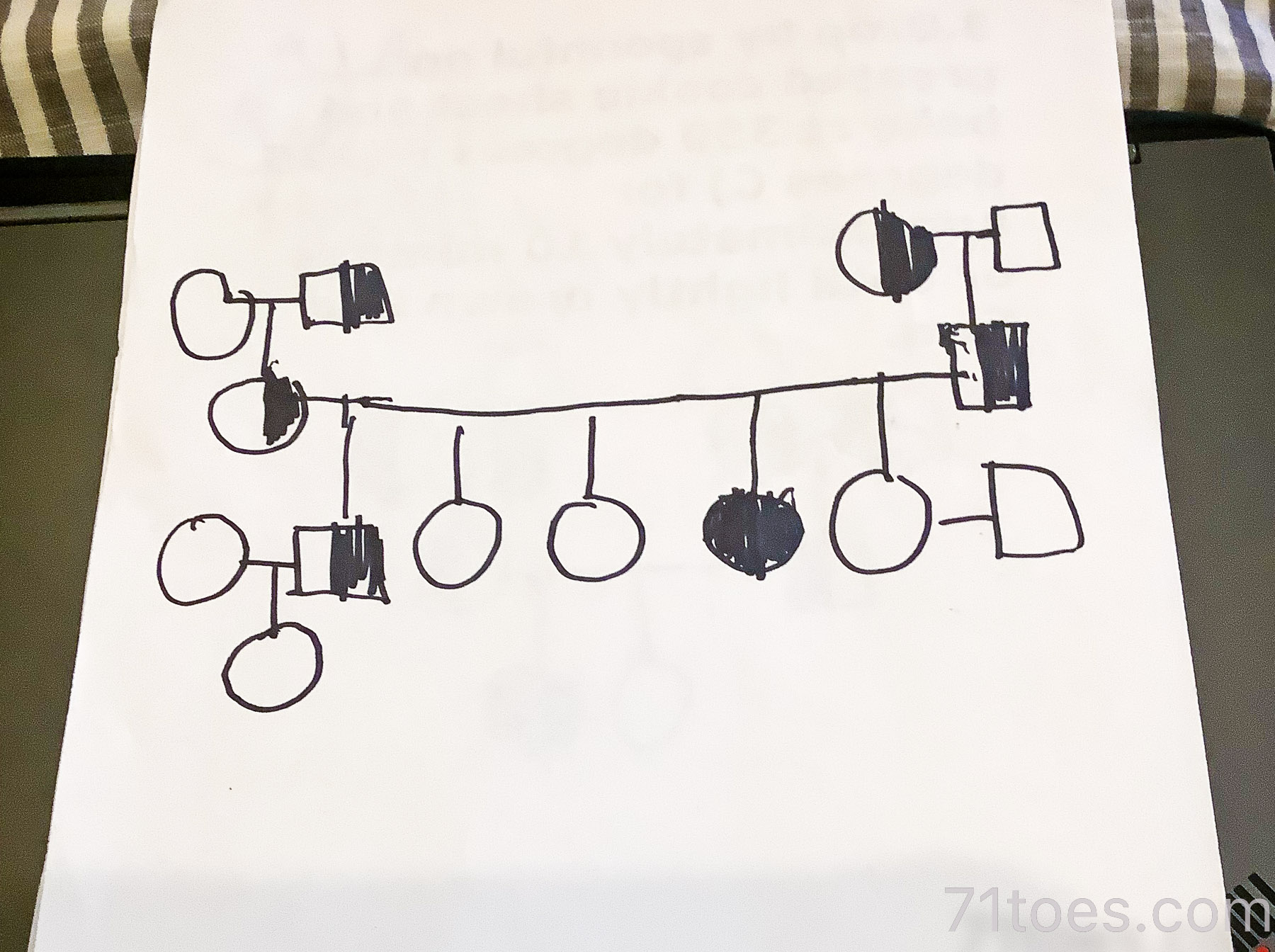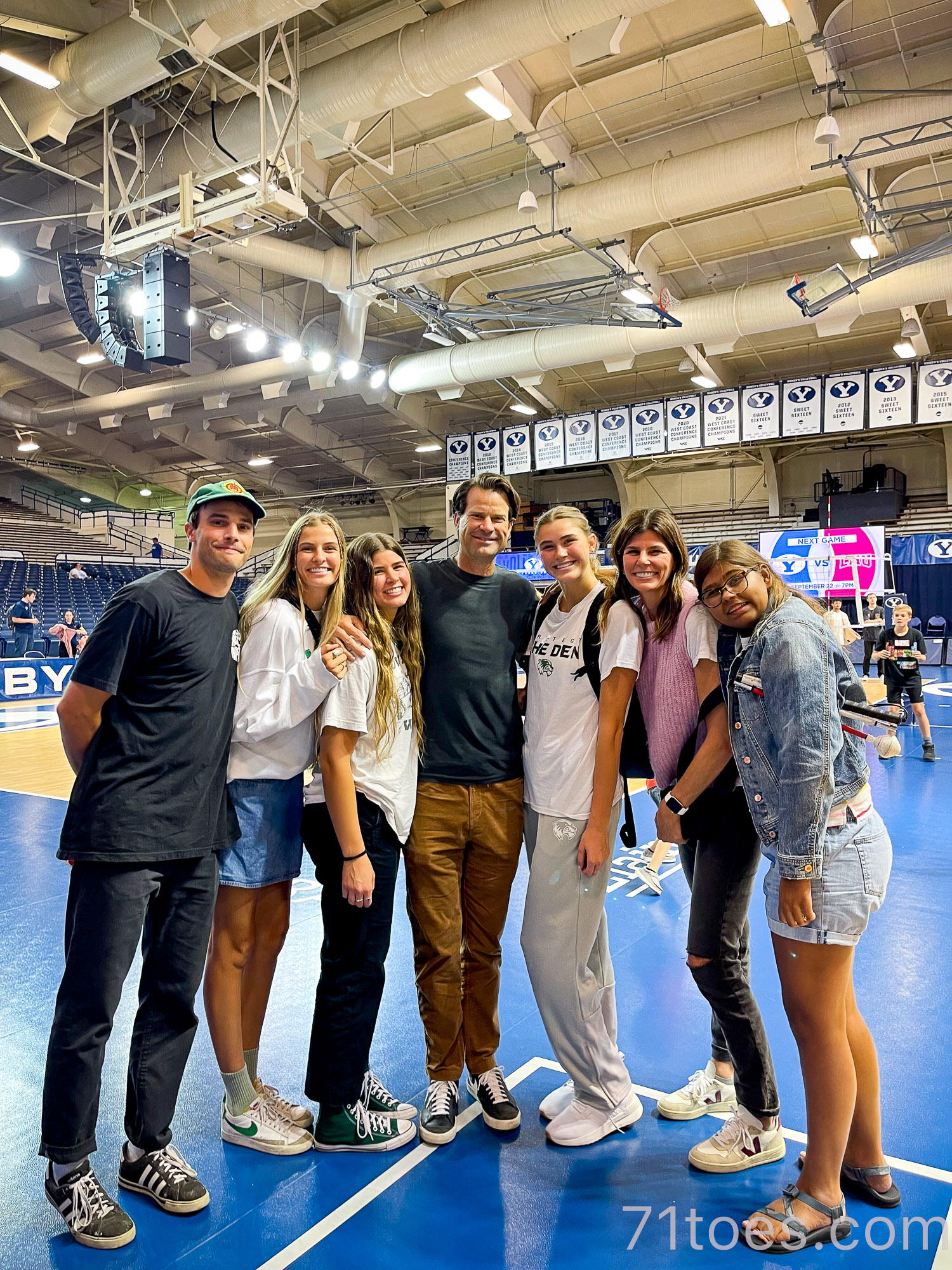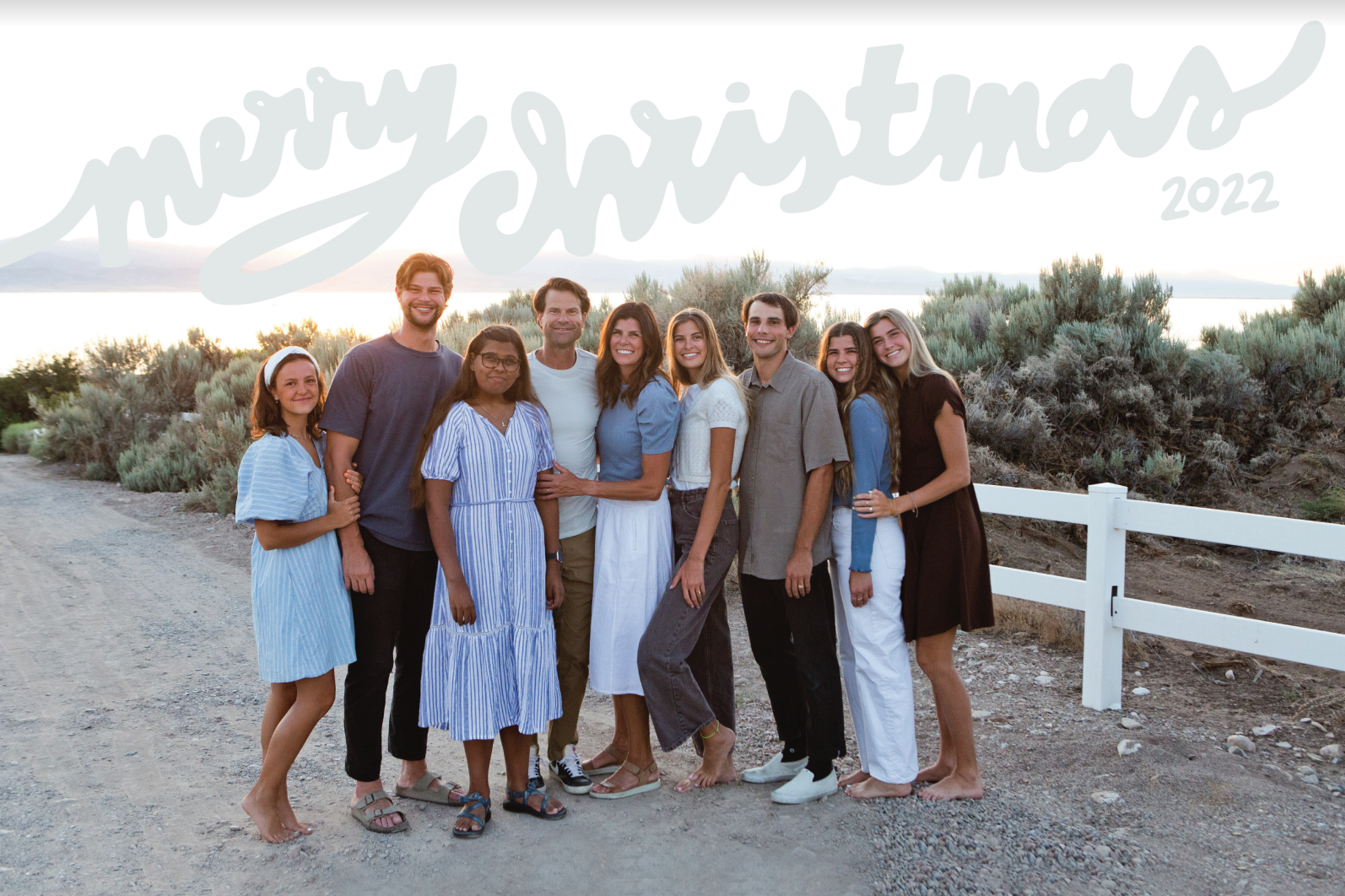Back when I got to announce we have a little “Peanut” on the way, (Max and Abby’s baby we can hardly wait to meet), I promised I’d come back to talk a little more about Lucy’s reaction to this big news.
Because as you may or may not know, Lucy is not a fan of babies.
At all.
I think they are just not predictable enough for her. She gets super grumpy if ever we are around any babies. Especially at church. It’s a real concern.
So Max and Abby were a little (actually a lot) apprehensive about telling her. All of us were.
When Dave, Lu and I headed up for the UVU/BYU volleyball game, we went to Max and Abby’s apartment after the game so they could let her know in person.
As soon as she grasped the news, she gave just the reaction we figured she would: she slunk down in the couch and got really somber and quiet. It was kind of a sad night, all of us pretty unsure how this was all going to go.
But I am happy to report that that is not the end of the story.
It’s been kind of fun and SO SWEET to watch Lucy come to grips with the whole idea, gradually.
And strangely, the thing that helped her start to come around was Bardet-Biedl (BBS her syndrome).
Max and Abby let us know they were getting tested to see if they were carriers for BBS. (A whole new dimension to this pregnancy, something Dave had hoped to have all the kids do before anyone got pregnant, but didn’t get to Max and Abby in time.). BBS is a genetic syndrome and both parents have to be carriers to pass this gene on to their children. Dave and I had no idea we were both carriers, nor that we had a 25% chance we’d pass on that unknown gene each time we had a baby.
At the news that Max and Abby were getting genetic testing, Lucy suddenly perked up and started asking all kinds of questions.
It was a process, but eventually they got the results: Abby is not a carrier, and Max is. Which is good news for the baby and their future babies, but lets us know that all their kids will have the potential to be carriers.
Lucy took all this in so earnestly and even drew up a Punnett square from what she studied in Biology last year, and sent it on our group family text with squares and circles showing who we know is affected so far.

Who knew a Punnet square could be so incredibly endearing?
A few days after we found out Peanut is a girl, Lucy texted me this: “do you think it’s ok if I start telling people about her?” (her texts are often quite cryptic, but I knew she was talking about the baby). I told her to ask Abby, and Abby said she sent her the sweetest text asking for permission to tell “a couple close friends” about it.
Such a big deal that she cared enough to want to tell friends, and it melts this mama heart of mine.
It’s an interesting process for sure, and who knows how it will all play out.
I mean, she’s definitely not snuggling up trying to feel the baby kicking at this point, but it’s been pretty beautiful to have a front row seat to watch the baby steps of acceptance lighting the way.




As a scientist that pedigree chart warms my heart! Well done, Lucy! Do both parents have to have the mutation in the same BBS gene for one of their children to potentially get the syndrome? Do doctors have any idea what percentage of the US or global populations are carriers?
Shawni, this is so interesting and I appreciate you sharing it with us. Warms my heart to hear how Lucy has come around to the idea of Peanut and I hope everything continues to go smoothly.
Since you mentioned you’d hoped to test your son and daughter in law earlier but life got away from you, it may be worth just getting ahead of the impending busy-ness of grandparenthood and testing them all now, so that they can go into their next stages of life armed with this information that we are so fortunate to have this day in age.
Thank you again for sharing and inviting us into your lives.
Lucy’s behavior is alarming. She is acting rather bratty, slumping in her seat, not being polite about their news, and getting “grumpy’ at church …(?) This is behavior that I would attribute to a spoiled child, not a teen. I know, I know, the syndrome, but can that be forever an excuse for inappropriate behavior?
in a world where you can be anything, be kind.
❤️
Oh Shawni! I can relate. My youngest sister struggled when the older siblings (my sister and I) started having kids. I feel like her life experiences led her to feel “replaced”. She had been the baby, the one who was with mom and dad alone the longest, etc. it’s a transition to add little people – the schedule changes, the noise level, the chaos it can bring. To be unsure in that adjustment is NORMAL. I’m so grateful Lucy (and my sister) felt safe enough to allow their true feelings to be seen. It’s ok to feel sad, replaced, worried, anxious… all the things. Now if she (anyone) stayed there forever, I’d be more concerned. But she (and my sister) didn’t do that. It may not be the instant “jumping and yelling for joy”, but she’s approaching it with caution until she feels safe with the situation.
We could all learn wisdom from this – it’s ok to feel uncomfortable with a situation… and to work up from there. ❤️
I think Shawni has mentioned that there are some genuine delays (if not at the very least difficulties) as a result of the syndrome, and it makes change/ unpredictability harder for Lucy to handle. It’s certainly not an “excuse” but it is an explanation, and they’ve mentioned many times that they’re working with different specialists to help with Lucy’s challenges, so that she’s better able to cope when difficult situations arise, as they will throughout her life. You made an interesting point that a teenager should be better behaved, and I think it brings up the value of compassion- nobody knows the full details of anyone else’s life, and hopefully we can all try to view others through a lens of kindness rather than judgement based on limited information. Surely you’d like the same grace extended to you and your loved ones in a situation like this ❤️
Are your children and teens always 100% compliant, cheerful and polite? Are you? We’re all allowed to have our feelings, Lucy is allowed to be sad, or grumpy, or apprehensive about being an aunty. She’s still so young, and even if she weren’t it’s still ok for her to feel what she feels. Shawni is doing the world a favour by being so honest about the ins and outs of family life – not everyone can be happy all the time.
Juniper, Lucy has developmental delays and differences. Your comment is stunningly unkind even if she didn’t
Your lack of self regulation is alarming. She is a teen with multiple health issues who can’t possibly relate very well for an older sibling having a baby. She may be full of concern over her own future and what that will be like. The point is the science stuff made the news relatable. You can’t parent away a tumor nor loads of other issues. Being critical of Lucy for her moods is like criticizing her for bumping into furniture if her gram moved the furniture since she last visited.
Don’t be a toad, Juniper.
Your last sentence is quite rude. That aside, I don’t think it would be fair for any of us to judge Lucy in this situation (harshly or not) based off of the few sentences that Shawni chose to share with us. Yes, Shawni said that Lucy was somber when hearing the news, and gets grumpy around babies. (She’s not the first person in the world to not be a fan of babies!) It’s a stretch to outright call Lucy bratty, impolite, or inappropriate based on what was said in this post. It might be your interpretation, but it’s not fact. We can all paint a picture in our heads based off of what we read here, but at the end of the day we aren’t there to get the full picture, or to judge so definitively.
This made me cry! Lucy seems like an amazing kid ♥️ Peanut is so lucky to have so many cool aunts.
I loved this post so much.
I wish people would keep their judgemental thoughts to themselves, yes Shawni and her family share the every day and the more private areas of their lives with us but that doesn’t give us the right to say those kind of things. Juniper you should go back again and read the post carefully because it’s not a story of an obnoxious grumpy teenager but a triumphant post of how Lucy is coming round. Changes are hard and she has already had to deal with so much change in her sixteen years. Although Lucy is not completely blind she will have already compensated and has her other senses working harder to help her understand the world around her, babies crying in church quite probably hurt her ears which are more sensitive than yours or mine.
When I got pregnant with my first, my four year old sister was not happy at all, I was the one who did most with her and I think she thought she was being pushed out. Initially it was a no go subject but she came round as we talked about names, she helped to paint the nursery, choose some clothes to buy and by the time my little boy arrived, she was as excited to hold him as everyone else. I’m sure Lucy will be the same with this precious little one.
My brother was also an apprehensive uncle. I think a lot of it was what you described – the unpredictability of babies made him nervous. What if it cried, pooped, spat up?! He eventually got over some of his fears and now has a very cute relationship with my kiddo. As we’ve entered the Lego/Duplo years it is really fun to watch them play together. I’m amazed by how patient he is as his adult-level Lego creations are disassembled while my son “plays”.
Not sure if this is too nosy, but I was interested to see that Max and Abby didn’t do genetic testing before becoming pregnant. On the other hand, I was pregnant in 2019 and it felt like they had endless tests and screenings to sell me. Sometimes it was hard to tell which tests would yield information that was actually useful to me, and which were just another source of anxiety.
Ha! Yeah the BBS test would have been just a little useful…..
Is there A reason Dave wanted to have his kids tested before they have children. You know what you would be dealing with if one of your grandchildren had it, and it wouldn’t matter if they tested positive because they wouldn’t terminate so I was just wondering if there was a reason behind him wanting them to be tested?
I think because if any of her kids happened to be carriers and then married someone who happened to be a carrier as well, they’d have a chance of passing it along, and at the very least a good chance of passing along the carrier gene. Since there’s genetic testing available, it would make sense for the kids to know if they’re carriers so that a) their spouses can get tested and b) they can make informed decisions about future family planning, such as choosing to use ivf if both are carriers. Another note about bbs: like many syndromes it presents differently in different people, so unfortunately it’s not as simple as knowing what to expect because they have a sibling with it.
I certainly don’t want to put words in Shawni s mouth so please don’t take this as answering for her, this is just what I would presume based on the idea of genetic testing 🙂
Maybe because if they both tested positive as carriers, they would do the responsible thing and NOT have children at all since they are 100% guaranteed to have the syndrome. That would be like purposely creating a child so it could suffer and eventually be blind.
Actually, Juniper, if you read Shawni’s post properly, it’s actually a 25% chance of their child having BBS if they are both carriers. I don’t know why you bother coming on here if you are here to post unkind things, but if you’re ping to be unkind, at least be accurate.
Thank you Jean, that makes sense, I don’t know much about genetic testing so thank you. You learn new things every day.
you are welcome, it was a very good question to ask. I am only familiar with it because our family is Ashkenazi Jewish and we have a higher rate of some very serious genetic disorders. Due to this it’s common in our community to do genetic testing in order to prevent passing along things such as tay-sachs, cystic fibrosis, or the BRCA gene. We are very grateful to have modern medicine and the ability to make the best choice for our family, and I’m glad Shawnis family has this tool at their disposal as well. I
This comment is cruel and inaccurate. Both parents being carriers means there’s a 25% chance they’ll pass on the gene, not 100%. If you looked at Lucy’s chart, you can see this illustrated very clearly.
These decisions and issues are more complicated and emotional than you seem to appreciate. Please, reserve your judgment.
I have to make some big decisions surrounding genetic testing for myself, in part to decide if/how I’ll have kids. Even deciding if I want to know whether or not I have the gene (in my case, huntingtin’s) is overwhelming. I appreciate you sharing this, Shawni, as there’s so much stigma and fraught emotion around topics like these.
I’m sorry but if both parents are carriers, even if there is a 1% chance that you will make a future child suffer, then you are selfish and are having one not for that child to be born and have a good and healthy life, but for other reasons, like your own personal fulfillment or family pressure. It’s not about you and what you might want or need, it’s whether your decision has any chance at all of making a child suffer.
And don’t say, “oh everyone has a chance of having a handicapped child” – yes, but that would be like Shawni and Dave, neither having a clue that they were carriers. If they had one now then that would be different since they know.
You mean you would suffer as the parent.
Ana,
I have an acquaintance who recenty learned she has the gene to develop huntingtons and is deciding song with her husband whether to have children. She mentioned that even more than the risk of passing it along (which can be limited though adoption, ivf, donor egg), she is worried about when she would get symptoms and if her kids would have to see her sick. Because there’s no set time, it could be when they’re 5 or when they’re 25, theres just no telling. I don’t mean to influence you at all I just wanted to share this since it’s such a rare condition and it’s a difficult decision to make, especially for people who yearn to be parents. I’m sure you’ll make the best choice for you and your family.
Sending you love as you navigate this ❤️
Oh I am sorry I read your comment wrong! It is very scary to decide whether to find out about the huntingtons gene, and the acquaintance I have spoken to at length about this shared a lot about this decision for her. She was recently married when she learned she may have it, and ultimately she felt she needed to know because it would influence in many ways how she lived her life, and decisions she and her husband made together. Her siblings have chosen differently and at different times in their lives, and to this day some have learned some have not. It is a personal choice and I know from what she’s shared with me that there are some wonderful online and in person resources to navigate this process. I wish you all the best and hope you’re surrounded by love and support through this.
Seems like testing before marriage would make a ton of sense. I also wonder if both your siblings have been tested. Lucy could make a SUPER IMPRESSIVE chart with all her aunts, uncles, and cousins listed
I meant both you and Dave’s siblings. (We know you have way more than 2)
I know with COVID suddenly everyone’s medical is now everyone’s business, but it’s really not. Least not this. The entire town knows with the Turkey Trot, blog readers, I don’t think the family is not aware. I have less than 10 first cousins on each side of my family and one side had childhood cancer, another side Down syndrome and Autism. And the occasional premie too small for the year’s medical advance yet managed to thrive anyway. And I would imagine the medical issues people keep quiet about. I adopted a healthy child with no known medical family history at all and turns out a special need was revealed a few years later they just would not have known about when he was a year. Is there really any value in knowing in advance 0%-25% of one possible medical issue among several out there? Sometimes you know right away. Sometimes it happens at birth something revealed or at age 4 or 5. Some people don’t do the test for Down syndrome in the womb because it doesn’t matter either way. The pregnancy would continue.
I don’t think you should have mentioned when tested or publicly shared an opinion or that you were trying to get them to test at a certain time. He is a man. She is a woman. Maybe she doesn’t have the generations of LDS and all the latter day branches in her family tree for over a hundred years and not really part of this closed community which brings about these things. It is not common like TaySachs which is in the Jewish community and people test before marriage and now showing up in the Irish. Having a syndrome is not a fate worse than death. Many with differences would not describe their life as one of suffering. Heaven help us if they start to test for lgbt.. If we didn’t hide away those with physical intellectual and mental differences perhaps would be decades ahead of managing them, even able to restore sight. Each baby would have 25% chance if both of them have it. Could be all or some or none.
Thank you, Lea! ❤ I’m looking forward to seeing a genetic counselor and deciding how I’m going to navigate everything. Hope your acquaintance is doing well.
It seems like there’s a lot of misunderstanding around genetic testing. It is such a huge and sometimes heavy process. My husband is a carrier of a truly terrible disease that took the life of his infant sister after great suffering. I was tested before we were married. I wasn’t a carrier. If I had been, it wouldn’t have changed our desire or plan to have children, just the method. We would have used preimplantation genetic diagnosis and screened embryos to select one without that particular disease. Certainly other challenges/health problems can still exist-we wouldn’t be trying to create a perfect child, but we could eliminate this disease that has caused great suffering for our family.
Our children could be carriers and will therefore also be tested as they enter their teenage years.
Whitney, while that is very responsible of you, I can’t help but wonder – after you selected one of the non diseased embryos for implantation, what did you do to any that were diseased? Flush them? Aren’t they viable humans as well. I think anyone in Shawni’s family would think that was horrifiying. Not that it is, but that is most likely not looked at in a positive light – at least by LDS couples.. but hey, the Pothier’s don’t follow any of the rules that don’t fit in with their life/plans…. so……
Whitney, while that is very responsible of you, I can’t help but wonder – after you selected one of the non diseased embryos for implantation, what did you do to any that were diseased? Flush them? Aren’t they viable humans as well. I think anyone in Shawni’s family would think that was horrifiying. Not that it is, but that is most likely not looked at in a positive light – at least by LDS couples.. but hey, the Pothier’s don’t follow any of the rules that don’t fit in with their life/plans…. so……
Whitney, while that is very responsible of you, I can’t help but wonder – after you selected one of the non diseased embryos for implantation, what did you do to any that were diseased? Flush them? Aren’t they viable humans as well. I think anyone in Shawni’s family would think that was horrifiying. Not that it is, but that is most likely not looked at in a positive light – at least by LDS couples.. but hey, the Pothier’s don’t follow any of the rules that don’t fit in with their life/plans…. so……
Whitney, that is very responsible of you, however after selecting the healthy embryos, I don’t think LDS couples would approve of the fate of the diseased ones. Probably rules against what they would consider disposing of viable future humans. But hey…. the Pothiers pick and choose their rules…. so….